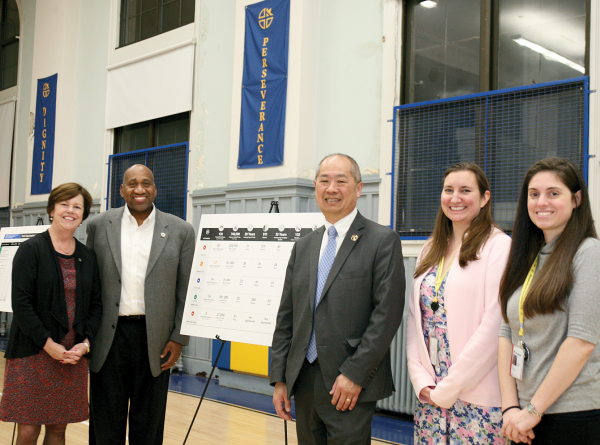January 31, 2024

Among those present at last Thursday’s meeting were Cristo Rey High President Rosemary Powers, state Rep. Russell Holmes, MBTA General Manager Phillip Eng, Laurel Senger, and Salina Martin - both deputy directors of the MBTA Track Improvement Program. Seth Daniel photo
MBTA General Manager Phillip Eng visited Savin Hill’s Cristo Rey School last Thursday for an open house focused on upcoming track work on the Red Line that he says will eventually eliminate the 53 existing “slow zones” that remain a frustration for customers and T employees.
The work is modeled on a successful “surge” last October that targeted the line’s leg between Mattapan Square and the JFK-UMass station. For that effort, buses replaced trains for 16 days as workers labored around-the-clock to install new track, ballast, and make fixes to stations.
A similar project has just been completed on the Green Line. Beginning this coming Monday (Feb. 5) and running through Wed., Feb. 14, the agency will be shifting its attention back to the Red Line between Alewife and Harvard stations with a nine-day closure .
In last week’s session at Cristo Rey, Eng told the Reporter that the surges are working as intended, showing that “the T is doing business differently and we’re holding ourselves accountable.
“That’s exactly what we’re seeing so far. Get in, give ourselves a dedicated work zone, and complete the work on time as we said. Then, when we come back, we’re giving them a system that is running at full speed.”
Other targeted disruptions later this year will focus on the Braintree branch, Eng said. But next up is the Alewife-Harvard stretch.
“We will be doing as we’ve done in the other places – removing all the speed restrictions,” he said. “I think there are about nine [slow zones] in that corridor now that might amount to six or seven minutes of [improved] travel time once we finish that.”
Track replacement will be the biggest part of the job, but workers will also target power and signaling issues along the right-of-way, and will clean, repair, and re-lamp stations. Track repairs will also be done between Harvard and Park Street stations in the overnight hours after 8:45 p.m. – when the entirety of the line from Alewife to Park will close until the next morning at 5 o’clock.
There’ll also be a 16-day closing in July from Alewife to Park Street Station for the elimination of nine slow zones that add about four minutes to a trip.
The bulk of the remaining work along the Red Line this year will be south of downtown from Park Street to Braintree, where, with faster speeds on the Ashmont line, Dorchester and Mattapan riders often experience drastic slowdowns from JFK to Park Street. There are still more than 30 slow zones on the Braintree branch, Eng said.
According to an MBTA review, there are still eight slow zones that add almost three minutes per trip between Park Street and JFK/UMass, and 22 slow zones from JFK/UMass to Braintree that add more than nine minutes per trip.
Another 16-day closure along the Braintree line is planned for September, and in October, there will be a six-day closing to address six slow zones between Kendall/MIT in Cambridge to Broadway in South Boston.
In December, another six-day diversion is expected from Broadway to North Quincy to address four slow zones that add nearly three minutes per trip. Immediately after, there will be another six-day closure between Harvard and Park Street Station downtown.
Eng added there will also be some weekend closures during the year to inspect tunnels, and address track work at the same time.
Ridership remains at roughly 70 percent of pre-pandemic ridership, Eng said, while noting that there are now two sets of new Red Line trains deployed in the system. He said the new Red Line cars coming in are “exceeding our quality standards,” as opposed to the disappointing quality in Orange Line cars delivered prior to his arrival, all 14 sets of which are now deployed.
The Orange Line is also scheduled for closures this summer, with separate 10-day closures scheduled in June to address the areas north of the city. An 11-day closure is on the books for September and October between Back Bay and Forest Hills stations and that is likely to impact those coming from Mattapan and parts of Dorchester.
Unlike previous repair jobs along the Orange Line, all the repairs on every line will be using a Track Stabilizer machine to ensure proper compaction and eliminate the need to let the track “settle” for two or three weeks. “We’re setting them up this time for success,” Eng said.
More open houses will continue throughout the year to help publicize these projects. Two virtual meetings are set for Feb. 21 at 6:30 p.m. and March 7 at 8 p.m. In-person open houses will be held on April 11, at 6 p.m. in the Boston Public Library Central Branch; on May 14 at 6 p.m. in the Mattapan Public Library; and on Aug. 19, at 6 p.m. in Jamaica Plain’s English High School.


